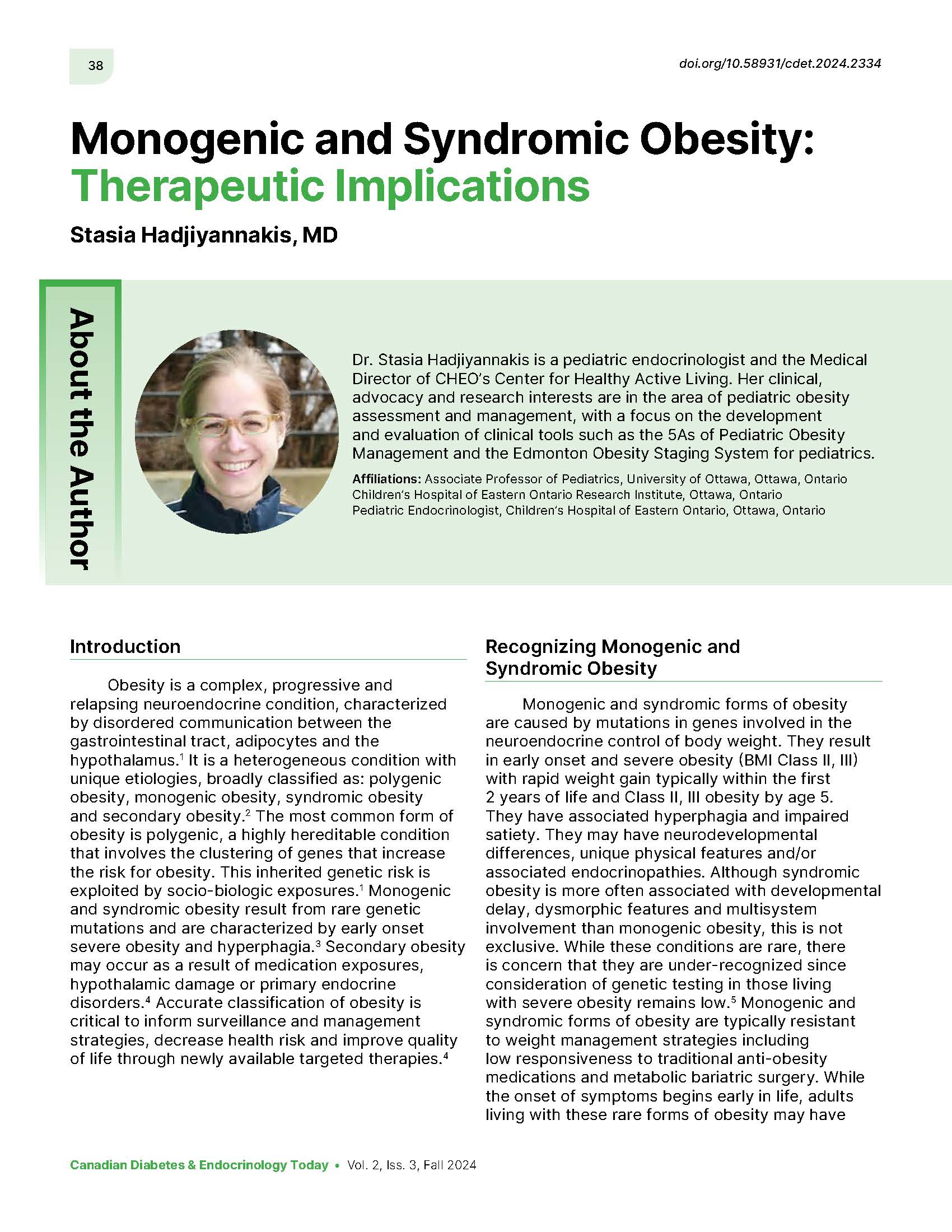Monogenic and Syndromic Obesity: Therapeutic Implications
DOI:
https://doi.org/10.58931/cdet.2024.2334Abstract
Obesity is a complex, progressive and relapsing neuroendocrine condition, characterized by disordered communication between the gastrointestinal tract, adipocytes and the hypothalamus. It is a heterogeneous condition with unique etiologies, broadly classified as: polygenic obesity, monogenic obesity, syndromic obesity and secondary obesity.2 The most common form of obesity is polygenic, a highly hereditable condition that involves the clustering of genes that increase the risk for obesity. This inherited genetic risk is exploited by socio-biologic exposures. Monogenic and syndromic obesity result from rare genetic mutations and are characterized by early onset severe obesity and hyperphagia. Secondary obesity may occur as a result of medication exposures, hypothalamic damage or primary endocrine disorders. Accurate classification of obesity is critical to inform surveillance and management strategies, decrease health risk and improve quality of life through newly available targeted therapies.
References
Schwartz MW, Seeley RJ, Zeltser LM, et al. Obesity Pathogenesis: An Endocrine Society Scientific Statement. Endocr Rev. 2017;38(4):267-96. DOI: https://doi.org/10.1210/er.2017-00111
Sohn YB. Genetic obesity: an update with emerging therapeutic approaches. Ann Pediatr Endocrinol Metab. 2022;27(3):169-75. DOI: https://doi.org/10.6065/apem.2244188.094
Malhotra S, Sivasubramanian R, Srivastava G. Evaluation and management of early onset genetic obesity in childhood. J Pediatr Genet. 2021;10(3):194-204. DOI: https://doi.org/10.1055/s-0041-1731035
Hampl SE, Hassink SG, Skinner AC, et al. Clinical practice guideline for the evaluation and treatment of children and adolescents with obesity. Pediatrics. 2023;151(2). DOI: https://doi.org/10.1542/peds.2022-060640
Mainieri F, La Bella S, Rinaldi M, et al. Rare genetic forms of obesity in childhood and adolescence: A narrative review of the main treatment options with a focus on innovative pharmacological therapies. Eur J Pediatr. 2024;183(4):1499-508. DOI: https://doi.org/10.1007/s00431-024-05427-4
Hinney A, Korner A, Fischer-Posovszky P. The promise of new anti-obesity therapies arising from knowledge of genetic obesity traits. Nat Rev Endocrinol. 2022;18(10):623-37. DOI: https://doi.org/10.1038/s41574-022-00716-0
Forsythe E, Mallya UG, Yang M, et al. Burden of hyperphagia and obesity in Bardet-Biedl syndrome: a multicountry survey. Orphanet J Rare Dis. 2023;18(1):182. DOI: https://doi.org/10.1186/s13023-023-02723-4
Twig G, Kark JD. Body-mass index in adolescence and cardiovascular death in adulthood. N Engl J Med. 2016;375(13):1300-1. DOI: https://doi.org/10.1056/NEJMc1609415
Bandini L, Danielson M, Esposito LE, et al. Obesity in children with developmental and/or physical disabilities. Disabil Health J. 2015;8(3):309-16. DOI: https://doi.org/10.1016/j.dhjo.2015.04.005
Butler MG, Manzardo AM, Heinemann J, et al. Causes of death in Prader-Willi syndrome: Prader-Willi Syndrome Association (USA) 40-year mortality survey. Genet Med. 2017;19(6):635-42. DOI: https://doi.org/10.1038/gim.2016.178
Krashes MJ, Lowell BB, Garfield AS. Melanocortin-4 receptor-regulated energy homeostasis. Nat Neurosci. 2016;19(2):206-19. DOI: https://doi.org/10.1038/nn.4202
Dayton K, Miller J. Finding treatable genetic obesity: strategies for success. Curr Opin Pediatr. 2018;30(4):526-31. DOI: https://doi.org/10.1097/MOP.0000000000000641
Paz-Filho G, Mastronardi CA, Licinio J. Leptin treatment: facts and expectations. Metabolism. 2015;64(1):146-56. DOI: https://doi.org/10.1016/j.metabol.2014.07.014
Farooqi IS, Jebb SA, Langmack G, et al. Effects of recombinant leptin therapy in a child with congenital leptin deficiency. N Engl J Med. 1999;341(12):879-84. DOI: https://doi.org/10.1056/NEJM199909163411204
Wabitsch M, Farooqi S, Fluck CE, et al. Natural history of obesity due to POMC, PCSK1, and LEPR deficiency and the impact of setmelanotide. J Endocr Soc. 2022;6(6):bvac057. DOI: https://doi.org/10.1210/jendso/bvac057
Haqq AM, Chung WK, Dollfus H, et al. Efficacy and safety of setmelanotide, a melanocortin-4 receptor agonist, in patients with Bardet-Biedl syndrome and Alstrom syndrome: a multicentre, randomised, double-blind, placebo-controlled, phase 3 trial with an open-label period. Lancet Diabetes Endocrinol. 2022;10(12):859-68. DOI: https://doi.org/10.1016/S2213-8587(22)00277-7
Clement K, van den Akker E, Argente J, et al. Efficacy and safety of setmelanotide, an MC4R agonist, in individuals with severe obesity due to LEPR or POMC deficiency: single-arm, open-label, multicentre, phase 3 trials. Lancet Diabetes Endocrinol. 2020;8(12):960-70. DOI: https://doi.org/10.1016/S2213-8587(20)30364-8
Iepsen EW, Zhang J, Thomsen HS, et al. Patients with obesity caused by melanocortin-4 receptor mutations can be treated with a glucagon-like peptide-1 receptor agonist. Cell Metab. 2018;28(1):23-32 e3. DOI: https://doi.org/10.1016/j.cmet.2018.05.008
Diene G, Angulo M, Hale PM, et al. Liraglutide for weight management in children and adolescents with Prader-Willi syndrome and obesity. J Clin Endocrinol Metab. 2022;108(1):4-12. DOI: https://doi.org/10.1210/clinem/dgac549
Salehi P, Hsu I, Azen CG, et al. Effects of exenatide on weight and appetite in overweight adolescents and young adults with Prader-Willi syndrome. Pediatr Obes. 2017;12(3):221-8. DOI: https://doi.org/10.1111/ijpo.12131
Liu SY, Wong SK, Lam CC, et al. Bariatric surgery for Prader-Willi syndrome was ineffective in producing sustainable weight loss: Long term results for up to 10 years. Pediatr Obes. 2020;15(1):e12575. DOI: https://doi.org/10.1111/ijpo.12575
Cooiman MI, Alsters SIM, Duquesnoy M, et al. Long-term weight outcome after bariatric surgery in patients with melanocortin-4 receptor gene variants: a case-control study of 105 patients. Obes Surg. 2022;32(3):837-44. DOI: https://doi.org/10.1007/s11695-021-05869-x
Poitou C, Puder L, Dubern B, et al. Long-term outcomes of bariatric surgery in patients with bi-allelic mutations in the POMC, LEPR, and MC4R genes. Surg Obes Relat Dis. 2021;17(8):1449-56. DOI: https://doi.org/10.1016/j.soard.2021.04.020
Campos A, Cifuentes L, Hashem A, et al. Effects of heterozygous variants in the leptin-melanocortin pathway on Roux-en-Y gastric bypass outcomes: a 15-year case-control study. Obes Surg. 2022;32(8):2632-40. DOI: https://doi.org/10.1007/s11695-022-06122-9

Downloads
Published
How to Cite
Issue
Section
License
Copyright (c) 2024 Canadian Diabetes & Endocrinology Today

This work is licensed under a Creative Commons Attribution-NonCommercial-NoDerivatives 4.0 International License.
